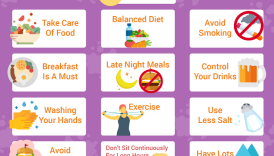Embrace a Healthier Lifestyle: Tips for a Better You

Importance of a Healthy Lifestyle
In today’s fast-paced world, the importance of maintaining a healthy lifestyle cannot be overstated. It is not just about avoiding illnesses; a healthy lifestyle impacts overall well-being, energy levels, and even professional and personal relationships. When individuals prioritize health, they tend to feel more active and engaged in their day-to-day activities. For instance, Lucy, a busy professional, noticed a significant increase in her productivity after she opted for healthier meals over processed snacks during work hours. This choice not only improved her concentration but also uplifted her mood, transforming her work experience entirely. Moreover, embracing a healthy lifestyle can help reduce the risk of chronic diseases, enhance mental clarity, and prolong life expectancy. Regular check-ups are important, but preventive measures through diet, exercise, and mindful practices can often keep serious health issues at bay.
- Embrace a Healthier Lifestyle: Tips for a Better You
- Importance of a Healthy Lifestyle
- Benefits of Adopting Healthier Habits
- Nutrition and Diet
- Understanding Nutrients
- Healthy Eating Tips
- Physical Activity
- Importance of Regular Exercise
- Fun Ways to Stay Active
- Mental Health and Wellbeing
- Stress Management Techniques
- Importance of Self-Care Practices
- Sleep and Rest
- Importance of Quality Sleep
- Tips for a Restful Night's Sleep
Benefits of Adopting Healthier Habits
The benefits of adopting healthier habits are extensive and impactful:
- Increased Energy Levels: A balanced diet and regular exercise contribute to higher energy levels, allowing individuals to seize the day with enthusiasm.
- Weight Management: Maintaining a healthy weight through smart nutrition and physical activity can prevent obesity-related conditions.
- Enhanced Mental Wellbeing: Engaging in physical activities like jogging or yoga can release endorphins, reducing stress and anxiety.
- Better Sleep Quality: Establishing a routine of healthy habits often leads to improved sleep patterns, promoting restful nights.
- Improved Longevity: A commitment to health can lead to a longer, more fulfilling life.
Adopting healthier habits is not merely an option; it is an investment in oneself. Just like investing in a savings account, building and maintaining one’s health reaps dividends over time. The transition to a lifestyle filled with energy, joy, and vitality can start with small changes, such as incorporating a daily walk or swapping sugary drinks for water. The important thing is to begin.
Nutrition and Diet
Understanding Nutrients
As we dive deeper into the realm of health, understanding nutrients becomes crucial. Nutrients are the building blocks of a healthy diet, and they play a vital role in how our bodies function. There are six main categories of nutrients: carbohydrates, proteins, fats, vitamins, minerals, and water.
- Carbohydrates: Often misunderstood, carbs are our bodies’ primary energy source. Think of whole grains, fruits, and vegetables rather than refined sugars and white flour.
- Proteins: Essential for muscle repair and growth, proteins come from sources like meat, fish, legumes, and nuts.
- Fats: While often seen as the enemy, healthy fats (found in avocados, nuts, and olive oil) are necessary for hormone production and nutrient absorption.
- Vitamins and Minerals: These micronutrients are critical for immune function, energy production, and other bodily processes. A colorful plate typically indicates a variety of vitamins and minerals.
- Water: The often-ignored nutrient, hydration is important for every function in the body, from maintaining temperature to facilitating digestion.
Understanding how these nutrients interact helps us make better food choices, driving us towards healthier lifestyles.
Healthy Eating Tips
Implementing what we know about nutrients into our daily routine can be easy and enjoyable. Here are some tips for healthier eating:
- Plan Your Meals: Engage in meal prep to ensure you have balanced options ready. This minimalist approach can save time and stress during busy weeks.
- Portion Control: Smaller plates can help with portion sizes, preventing overeating without feeling deprived.
- Mindful Eating: Take time to savor meals without distractions. This practice can help recognize hunger and satiety cues.
- Incorporate Variety: Challenge yourself to try a new fruit or vegetable each week. This not only adds excitement to meals but also ensures a broader nutrient intake.
- Stay Hydrated: Keep a water bottle nearby. Sometimes, we confuse thirst for hunger, leading to unnecessary snacking.
By grasping the significance of nutrients and implementing these healthy eating tips, individuals can refocus their diets towards promoting overall health and vitality. Making informed choices leads to better energy levels and can significantly enhance quality of life.
Physical Activity
Importance of Regular Exercise
Transitioning from proper nutrition to physical activity, it’s essential to acknowledge how vital regular exercise is for maintaining a healthy lifestyle. Just like food fuels our bodies, physical activity keeps everything running smoothly. It delivers numerous benefits, from enhancing cardiovascular health to boosting mental well-being. Consider John, who was once a fitness skeptic. After a few months of incorporating exercise into his routine, he noticed improvements in his energy levels and mood. Exercise releases endorphins, often dubbed the “feel-good” hormones, which can help combat stress and anxiety. Besides mood elevation, regular physical activity aids:
- Weight Management: Helps maintain a healthy weight and prevent weight gain.
- Strengthens Muscles and Bones: Regular resistance training can enhance muscle strength, improve bone density, and reduce the risk of osteoporosis.
- Boosts Immune Function: Engaging in physical activity can bolster the immune system, helping the body fend off illnesses.
- Promotes Better Sleep: People who exercise regularly often report improved sleep quality; the body craves a restful night after being adequately stimulated.
Fun Ways to Stay Active
Now, the best part—staying active doesn’t have to be a chore! There are countless enjoyable ways to include physical activity in daily routines, making it feel less like work and more like play. Here are some ideas:
- Group Activities: Join a local sports team or a dance class. Whether it’s soccer, basketball, or salsa, being part of a group can keep motivation high.
- Outdoor Adventures: Go hiking, biking, or even gardening. Nature has a wonderful way of refreshing the spirit while getting the body moving.
- Family Playtime: Engage in activities with loved ones, like playing tag or going for a family walk after dinner. It’s quality time spent while keeping everyone active.
- Home Workouts: Try online fitness classes that suit your interests, whether it’s yoga, Pilates, or high-intensity interval training (HIIT). The convenience of home workouts can fit into the busiest of schedules.
By finding fun ways to integrate physical activity into daily life, individuals can reap the benefits of exercise while enjoying themselves in the process. The key is to stay consistent and make movement a joyful part of life—because when you enjoy what you’re doing, it’s easier to keep coming back for more!
Mental Health and Wellbeing
Stress Management Techniques
As we transition from the physical benefits of exercise into the realm of mental health, it’s important to recognize how intertwined our physical and emotional wellness really are. Living a healthy lifestyle cannot be complete without addressing mental well-being, especially in today’s fast-paced world, where stress can often feel overwhelming. Consider Sarah, who juggled a demanding job and family life. She found herself constantly stressed, leading to burnout. After exploring various stress management techniques, she discovered some effective strategies that transformed her approach to daily challenges:
- Mindfulness Meditation: By setting aside just 10 minutes a day to breathe and focus on the present, Sarah found that her stress levels significantly decreased.
- Physical Activity: Exercise wasn’t just for blood pumping; for Sarah, going for a walk during lunch breaks became a refreshing escape from her desk.
- Structured Planning: Breaking tasks into manageable chunks helped her avoid feeling overwhelmed. With a simple to-do list, she tackled priorities without the burden of unfinished tasks hanging over her.
- Breathing Exercises: Deep breathing techniques could be done anywhere, which offered immediate relief during stressful moments.
Importance of Self-Care Practices
While managing stress is critical, it’s equally important to prioritize self-care. Engaging in self-care practices is not merely a luxury; it’s a necessity for maintaining good mental health. Many people, like John, often overlook self-care in their pursuit of productivity, only to realize its significance later on. Here’s why self-care is essential:
- Restores Energy: Taking time to recharge, whether through a hobby or simply relaxing, helps maintain energy for daily tasks.
- Boosts Mood: Activities that bring joy—be it reading, painting, or taking a long bath—stimulate positive emotions.
- Enhances Productivity: Ironically, allowing ourselves moments of rest can lead to greater effectiveness when tackling responsibilities.
- Strengthens Relationships: Prioritizing personal time allows individuals to engage more fully in their relationships, benefiting both them and their loved ones.
Self-care practices can range from taking a day off work to indulge in a favorite activity to scheduling regular outings with friends. By consciously making time for oneself, individuals not only improve their mental health but also create a more balanced and fulfilling life. The path to overall well-being is nuanced, but integrating stress management and self-care is a delightful step towards thriving, rather than simply surviving.
Sleep and Rest
Importance of Quality Sleep
After discussions on physical activity and mental well-being, we now turn to a crucial pillar of health that is often overlooked—quality sleep. Just as food nourishes the body and exercise strengthens it, restorative sleep rejuvenates the mind and supports overall health. Consider Michael, who found himself often sleep-deprived due to long working hours and late-night screen time. Over time, he noticed his mood swings increased, productivity declined, and he felt sluggish throughout the day. Research shows that quality sleep is essential for various reasons:
- Cognitive Function: Sleep contributes to memory consolidation, helping us retain information and perform tasks efficiently.
- Emotional Regulation: A lack of sleep impairs emotional stability, leading to increased irritability and a tendency to react more negatively to stress.
- Physical Health: Quality sleep is linked to a reduced risk of conditions such as heart disease, obesity, and diabetes, as it regulates bodily functions and hormone levels.
- Immune System Support: Sleep helps the body repair and recover, boosting immunity to fend off illnesses.
For Michael, realizing the importance of quality sleep was a game-changer in his pursuit of health and happiness.
Tips for a Restful Night’s Sleep
To foster better sleep, several actionable strategies can be adopted. It’s about creating an environment that encourages relaxation and a mindset that prioritizes restful habits. Here are some effective tips:
- Establish a Consistent Sleep Schedule: Go to bed and wake up at the same time every day, even on weekends. This regulates your body’s internal clock.
- Create a Calming Pre-Sleep Routine: Engage in relaxing activities before bed, such as reading or meditating, to signal your body it’s time to unwind.
- Limit Screen Time: Reduce exposure to screens at least an hour before bed. The blue light emitted can interfere with melatonin production, making it harder to fall asleep.
- Control the Sleep Environment: Keep the bedroom cool, dark, and quiet. Consider using earplugs, eye masks, or a white noise machine for added comfort.
- Watch Diet and Caffeine: Avoid large meals, caffeine, and alcohol before bedtime, as they can disrupt sleep patterns.
- Stay Active During the Day: Engaging in physical activity earlier in the day can enhance the quality of night’s sleep.
By prioritizing quality sleep and integrating these tips into daily routines, individuals can enjoy not only improved health but also a more vivid, focused, and energized life. Ensuring restful nights is an indispensable part of the journey toward overall wellness!





